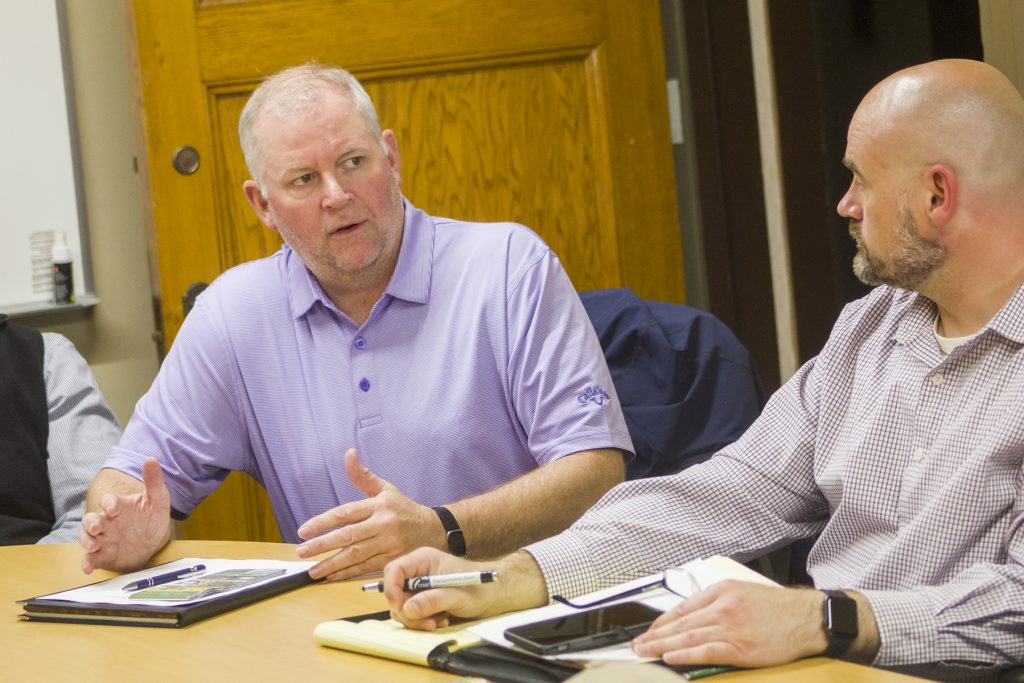
28 Apr MSP drug enforcement team focused on heroin, meth, prescription opioids
BELDING — About every five years, looking back on various trends, significant change can be found, from phones to clothing … to drugs.

Det. Sgt. Joel Abendroth, who runs the Michigan State Police Central Michigan Enforcement Team, left, speaks on the topic of serious drug issues in Montcalm and Ionia counties as a guest speaker at Wednesday’s Greater Greenville Transportation Committee meeting in Belding as committee member and Kent County Road Commission Transportation Planner Rick Sprague listens. — DN Photo | Cory Smith
During Wednesday evening’s Greater Greenville Transportation Committee meeting at Belding City Hall, guest speaker Det. Sgt. Joel Abendroth, who runs the Michigan State Police (MSP) Central Michigan Enforcement Team (CMET), painted a current picture of the drug landscape and how it compares to past years.
“In 2001, If you had asked me to go buy heroin in a town like Belding, I would have laughed,” he said. “That’s different today. Drugs have changed over my 24 years in law enforcement, and about every five to six years, the trends change.”
According to Abendroth, while a variety of drugs have circled through in popularity in Michigan, currently, there are three major illegal drugs that are plaguing the state.
“The state has identified three primary drugs as the largest threat — heroin, prescription opioids and methamphetamine,” he said. “As a result, teams like CMET focus our attention on those three.”
Abendroth said those three drugs all have a presence within Montcalm and Ionia counties, and the problem isn’t going away anytime soon.
“Our communities, and the greater Greenville area, we are primarily a heroin and methamphetamine community,” he said. “Now, these drugs are importing from Mexico and South America at rates we’ve never seen before. It’s cheaper, better, and now easier to get.”
As a result, Abendroth said the amount of physical meth labs in the area has declined drastically, as it is cheaper to obtain the drugs through other methods.
“They will still exist obviously, but because of the availability of crystal meth — powdered meth to crystal — coming from the cartels and other standard importation, we are seeing a huge spike in all four counties of crystal meth and also prescription opioids,” he said.
Abendroth added that synthetic heroins, such as fentanyl and carfentanil, have led to a boom in the sales of heroin at cheaper costs.
“Now heroin, it’s again readily available in our four-county area and it’s mostly coming through the dark web,” he said.
Abendroth said my users and dealers will simply order the drugs through the dark web — the part of the internet that is only accessible by means of special software, allowing users and website operators to remain anonymous or untraceable — and have drugs physically mailed through the postal service or other third-party delivery services, such as FedEx.
“It’s pennies on the dollar compared to what meth used to cost, making it the other way,” he said. “You can’t cook it as cheap as you can buy it anymore.”
Primarily, Abendroth said the drugs are coming to Michigan through larger, more urban cities that include Lansing, Flint, Saginaw, Grand Rapids and Muskegon, and then make their way to rural communities such as Belding and Greenville.
“We don’t have any open-air street markets, there’s nowhere I know of where I can pull my car over and order these drugs, but you can go to Grand Rapids and have that happen, yes,” he said. “Instead, people are coming from our communities to these source cities and then bringing the drugs back.”
Abendroth added there are also situations where dealers from Grand Rapids will temporarily set up shop in a location, otherwise known as a “drug house,” in Ionia or Montcalm counties to sell their drugs.
“There’s a market there, and they can charge a little extra for it for transportation fees,” he said.
Abendroth said efforts are being made, pointing to a recent apprehension of 22 pounds of cocaine that came through the baggage claim at Gerald R. Ford International Airport earlier this month.
“We know where the problems are, but it is a challenge. Heroin is going to be here for a while. It’s a focus, it’s a challenge,” he said. “And the synthetic drugs are even more of a danger, you can take maybe a quarter of a fingernail of powder of heroin and overdose, but with fentanyl, you only need a couple of specs and you can cause an overdose. With carfentanil, just one spec will lead to an overdose. The scary thought is, if you’re buying heroin today, you don’t know if it’s heroin or pure fentanyl.”
On the topic of marijuana, which is now legal on both medical and recreational levels in Michigan, Abendroth said it will be a challenge to pursue those who abuse the drug by choosing to drive after using it.
“With the legalization of marijuana, I think you will see a greater impact, you are going to see an increase in drugged driving, I have no doubt because there is going to be more of it in the streets,” he said.
Eureka Township Board Trustee Marty Posekany said he is hopeful the state will eventually implement a tetrahydrocannabinol (THC) — a cannabinoid identified in marijuana — limit that could be enforced.
“In my opinion, they need to come up with that THC limit, use an oral fluid test, and check it right on the spot to tell you if THC is in the system,” he said.
According to Abendroth, a pilot program of roadside testing of oral fluids currently exists in five Michigan counties, but still poses lots of challenges.
“If they test positive, it could have been from using marijuana two days ago,” he said. “It’s not like testing for alcohol, where when it’s in your blood, you’re under the influence.”
[ad_2]
Source link




No Comments